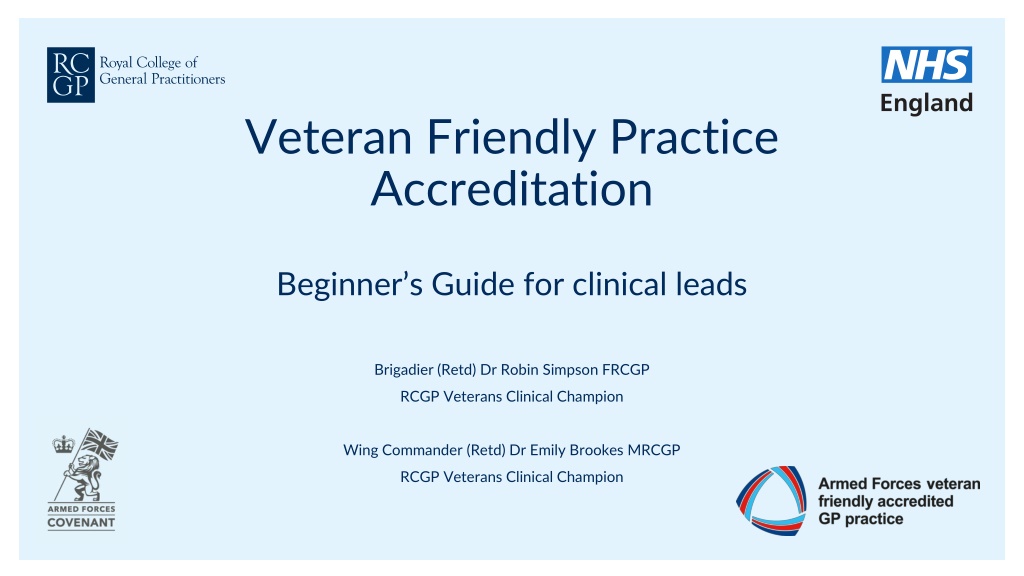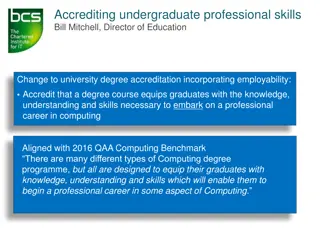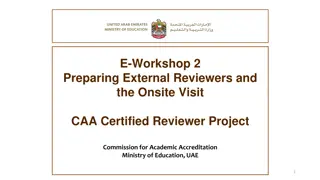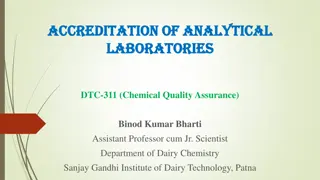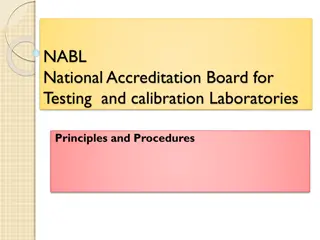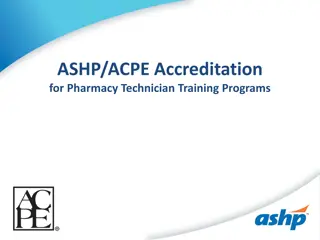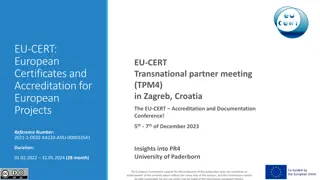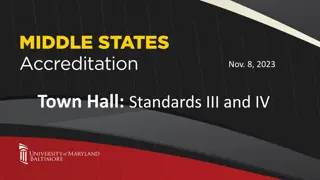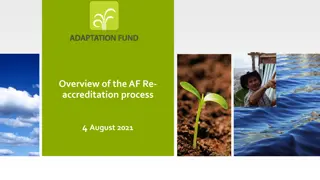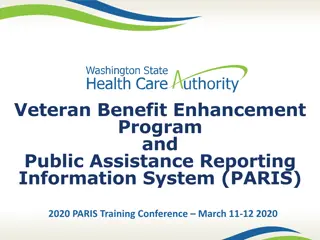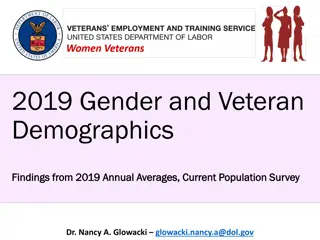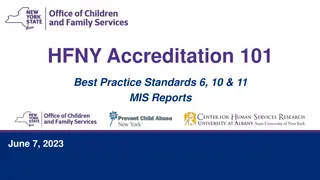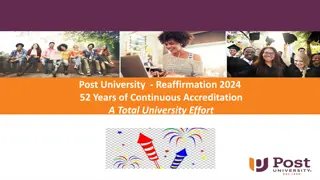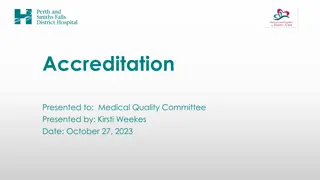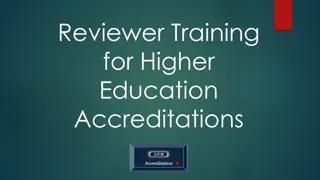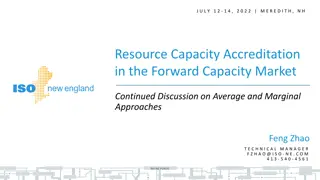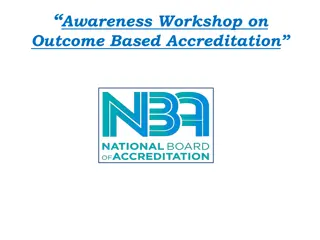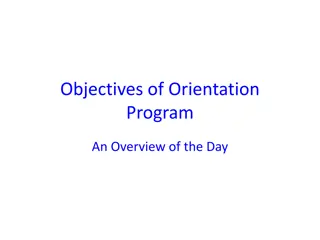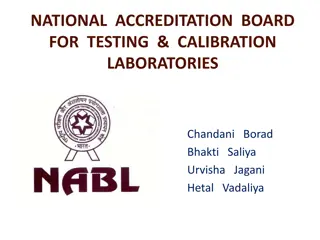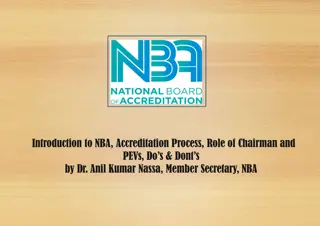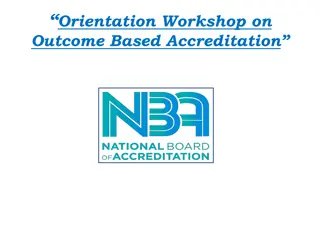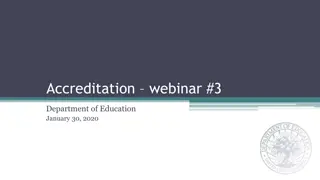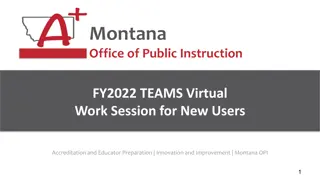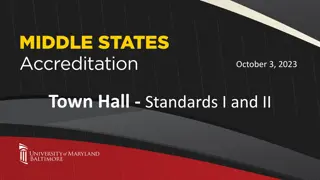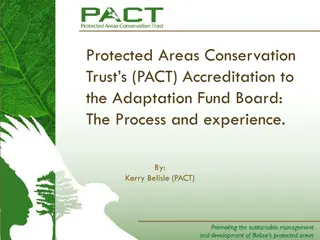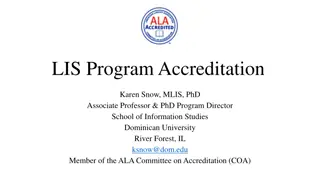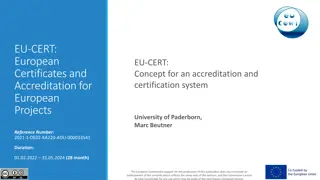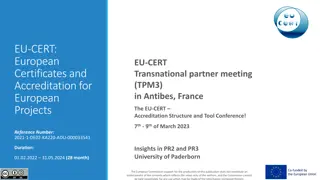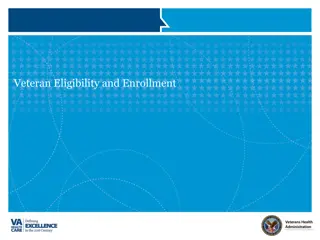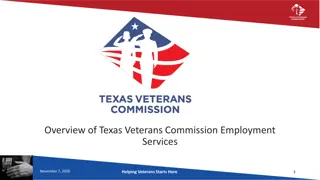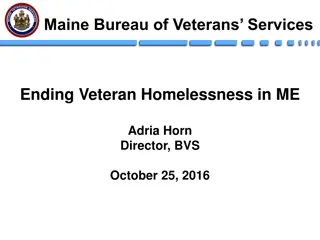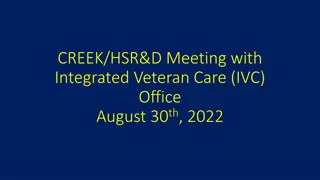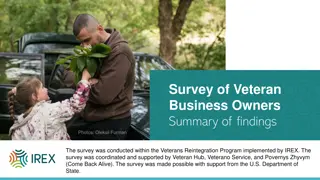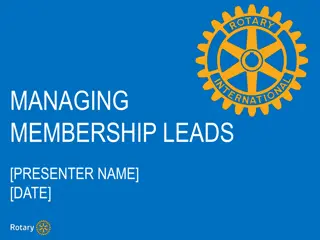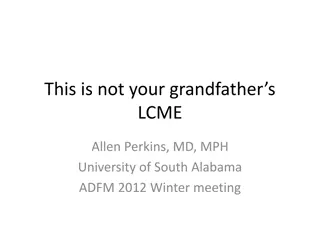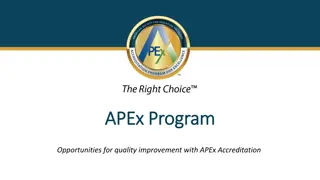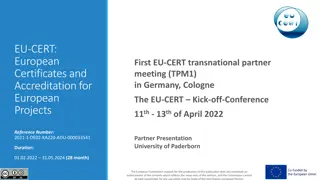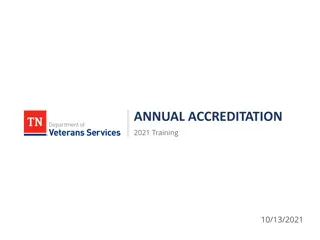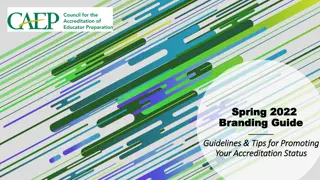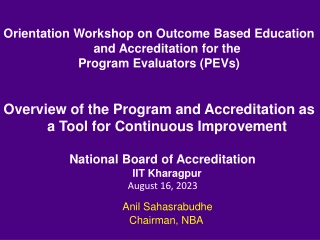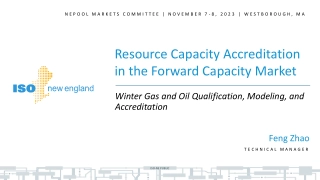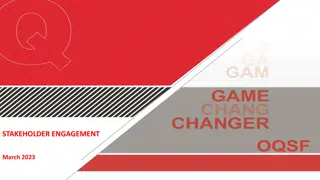Veteran-Friendly Practice Accreditation: A Beginner's Guide for Clinical Leads
Congratulations on achieving veteran-friendly practice accreditation! This guide provides essential information for clinical leads to enhance medical care for veterans, including access to specific NHS services and reducing practice workload. Learn the role of the clinical lead, expectations of an accredited practice, and the importance of being veteran-friendly. Embrace the commitment to the Armed Forces Covenant and NHS Constitution. Join the initiative to ensure all GPs in England can effectively serve veterans and their families.
Download Presentation

Please find below an Image/Link to download the presentation.
The content on the website is provided AS IS for your information and personal use only. It may not be sold, licensed, or shared on other websites without obtaining consent from the author. Download presentation by click this link. If you encounter any issues during the download, it is possible that the publisher has removed the file from their server.
E N D
Presentation Transcript
Veteran Friendly Practice Accreditation Beginner s Guide for clinical leads Brigadier (Retd) Dr Robin Simpson FRCGP RCGP Veterans Clinical Champion Wing Commander (Retd) Dr Emily Brookes MRCGP RCGP Veterans Clinical Champion
Congratulations on becoming a veteran friendly practice! Going forward, this will help to improve the medical care of veterans. This includes, where indicated, enabling access to specific NHS services for veterans and potentially reducing workload for the practice. This PowerPoint presentation for clinical leads, along with the accreditation resources, provides all the information you need to get started. The content in this slideshow is the same as in file 1b, VFGP Information for Clinical Leads . Please use whichever you prefer.
Role of the clinical lead Be the point of contact for practice staff on veteran matters. Be the point of contact for the RCGP project team to disseminate new information to your practice team such as the contents of the quarterly newsletter. Educate and informing your practice team about the programme and how they can contribute to providing excellent care to your veterans. Safeguard the sustainability of accreditation by handing over the clinical lead role to a colleague should you leave your practice and provide the RCGP with your successor s contact details.
Expectations of an accredited practice Endeavor to know who your veterans are and apply the military veteran SNOMED code to their notes. Commit to keeping staff up to date with NHS veteran-specific referral pathways and resources, and an understanding of the needs of veterans. The RCGP will help with this. Look out for quarterly newsletters and CPD updates.
Why is being a veteran friendly practice important? Practice commitment to Armed Forces Covenant a promise from the nation that those who serve or have served in the armed forces, and their families, are treated fairly. Practice commitment to the NHS Constitution for England, principle four The NHS Constitution for England, principle four states: The patient will be at the heart of everything the NHS does. It should support individuals to promote and manage their own health. NHS services must reflect, and should be coordinated around and tailored to, the needs and preferences of patients, their families and their carers. As part of this, the NHS will ensure that in line with the Armed Forces Covenant, those in the Armed Forces, reservists, their families and veterans are not disadvantaged in accessing health services in the area they reside. Patients, with their families and carers, where appropriate, will be involved in and consulted on all decisions about their care and treatment. The NHS will actively encourage feedback from the public, patients and staff, welcome it and use it to improve its services. Part of NHS Long Term Plan To ensure all GPs in England are equipped to best serve our veterans and their families, over the next five years we will roll out a veterans accreditation scheme in conjunction with the Royal College of GPs.
Why is being a veteran friendly practice important? CQC RCGP programme can be used to demonstrate understanding of the diverse health and care needs of people and their local communities. Professor Helen Stokes-Lampard, Ex Chair of the Royal College of GPs: Veterans often have unique health needs, and this new scheme is a fantastic way of ensuring that when they visit their GP, for whatever reason, these needs are flagged up, considered and accommodated.
Five steps to getting started 1. Continue reading this PowerPoint containing essential background information. 2. Complete the eLearning package, which will be relaunched in May 2024. We will let you know when it is ready, and it should take no more than an hour. 3. Undertake audit of the number of Veterans registered in your practice. File 3 in this pack ( Recognising veterans in the GP practice population audit template) provides a template for this audit to assist you and some initial ideas of how to improve the number of patients coded as veterans. Top tip: this could be a good quality improvement project for a GP trainee!
Five steps to getting started 4. Provide a presentation to your practice team so that they understand what being veteran friendly means, why it is important and how every individual can contribute to improving veterans care. We have provided a suggested PowerPoint presentation to deliver to your practice (document 2, Training for clinical lead to deliver to staff ). You could encourage your staff to complete the eLearning package too. 5. Let your patients and prospective patients know that you are now veteran friendly. We know that this really helps to break down barriers for veterans in seeking healthcare. We have provided a logo you can add to your practice website and signatures (documents 5a/b, Veteran friendly accreditation logo ), a slide for your appointment screen (document 6, Appointment screen graphic ) and a poster for your waiting room (document 7, Waiting room poster ).
Essential knowledge for clinical leads How many veterans are there? There are 1.74 million veterans in England with 7% of households having a veteran. Who is a veteran? A veteran is anyone who has served for at least one day in the UK Armed Forces (Regular or Reserve). The majority will have served for over 10 years. On average, 7% of patients registered with a GP practice will be a veteran.
Why are veterans treated as a special group? They are more likely to have: long term illness, disability or infirmity (BMJ 2021). More than half (52%) of veterans experience this, which is higher than the general adult population (35%). a common mental health disorder (BMJ 2021) including adjustment disorders, drug and alcohol-related problems, mood disorders and PTSD. Rates of PTSD in those who have seen conflict are significantly higher than in the general population and symptoms may not emerge for many years.
Why are veterans treated as a special group? They are more likely to have: musculoskeletal disorders such as arthritis, lower back, hip and knee pain that impair mobility (US Veterans 2016). difficulty hearing. Veterans are about 3.5 times more likely than the general adult population to experience this under the age of 75 (Royal British Legion s Lost Voices report 2014). Smoking related illness (BMJ 2021).
Why are veterans treated as a special group? They relinquish civil liberties whilst serving and risk life and limb. They live a mobile life and are frequently posted, including abroad. They are separated from loved ones and family for extended periods of time. Their service is recognised by the nation in the Armed Forces Covenant, which is enshrined in law. They must be treated fairly and not be disadvantaged by their service.
Veterans who may have specific needs Female veterans More likely to leave military early for family reasons. More likely to have experienced bullying and harassment while serving. May have more physical or mental health issues but not seek help. May feel that their service was not recognised. LGBT+ veterans Prior to 2000, there was a blanket ban on LGBT+ in the Armed Forces (LGBT Veterans Independent Review 2023). Evidence of a culture of homophobia, sexual assaults, abusive investigations leading to peremptory discharges. Significant consequences in terms of mental health and wellbeing, homelessness, employment, personal relationships and financial hardship.
Veterans experiences of the Armed Forces Being in the Armed Forces is an overwhelmingly positive influence for most service personnel, giving them the skills and experiences to live a positive and flourishing life beyond their time serving in the military. Anonymous veteran Being in the forces gave me a structure and a sense of family that I d never had. Anonymous veteran with 20 years service, including the Falklands Conflict
Benefits of a veteran friendly practice to veterans Breaks down barriers to seeking medical care and support. Leaving the armed forces can be a challenging and difficult time, sometimes likened to that of a bereavement reaction. Veterans can miss the structure, support and friendship of the military community and rely on formal and informal military structures and systems.
Benefits of a veteran friendly practice to veterans Veterans are used to readily accessible primary care provided by Defence Medical Services, often by military GPs who served alongside them. Research shows veterans believe NHS staff don t understand the military context. Enables swift access to specific NHS services for veterans such as Op RESTORE and Op COURAGE.
How does it help a clinician to know their patient is a veteran? The clinician can understand the background and context to the patient s consultation. For some conditions, veterans can be referred to veteran- specific NHS services, which may lead to swifter treatment or help and prevent the need for a clinician to make multiple referrals.
How does it help a clinician to know their patient is a veteran? Depending on their situation and the nature of the treatment required, the NHS offers priority treatment to veterans. When referring a veteran for a service-related problem, please write on any referrals that the patient is a veteran. They could get secondary care treatment quicker than usual, which can increase patient satisfaction and reduce the need for repeated GP appointments. Please write on the referral that the patient is a veteran.
Benefits of veteran friendly accreditation to the GP team Supports practices to identify and code their veterans. Improved care of veterans and primary care team s understanding of their needs. More efficient care of veterans by accessing specialist NHS care pathways therefore potentially decreasing primary care workload.
Benefits of veteran friendly accreditation to the GP team Demonstrates the practice s commitment to the Armed Forces Covenant which is enshrined in law. Part of the NHS Long Term Plan Demonstrates commitment to the NHS Constitution for England, principle four Can be used to demonstrate the practice s understanding of diverse health and care needs of people and local communities to the CQC. Potentially an improved a sense of teamwork and morale amongst staff.
NHS veteran-specific referral pathways Op COURAGEis the NHS veterans mental health and wellbeing service. Everyone at Op COURAGE is either from the armed forces community or is experienced in working with serving personnel, reservists, veterans and their families. Op COURAGE can be accessed via self-referral, through a family member or friend, via the GP or a charity. For more information visit www.nhs.uk/opcourage.
NHS veteran-specific referral pathways Op RESTOREis the NHS veterans physical health and wellbeing Service. Uses a network of civilian and military consultants, along with welfare support from military charities, to support a veteran s health using a holistic approach. Op RESTORE does not shorten NHS waiting times; it seeks to ensure the veteran waits well and is seen by the most appropriate clinician for their needs.
NHS veteran-specific referral pathways Op RESTORE supports veterans with service-attributable physical health conditions, regardless of how long they served for and when they left the Armed Forces. Op RESTORE is accessed via a GP referral. GPs can obtain a referral form by email to imperial.oprestore@nhs.net. For more information visit Op RESTORE.
Veterans Gateway is the first point of contact for welfare needs including housing, finances, employment, and physical and mental wellbeing for veterans and their families (available by phone, text, online chat or email). Visit www.veteransgateway.org.uk. Additional resources available to veterans There is a wealth of charities which support veterans and their families Fighting with Pride (FWP) supports the health and wellbeing of LGBT+ veterans, service personnel and their families. Visit www.fightingwithpride.org.uk. You may want to explore what local veteran s charities serve your practice population.
How do we identify patients who are veterans? The GMS1 patient registration form asks patients if they have served in the UK Armed Forces. Ensure this is also added to your practice s online registration form. If the patient answers yes and they are a veteran, capture the information on their electronic record by adding military veteran as a Problem title to ensure the correct SNOMED code is applied. Consider undertaking an audit to identify how many veterans are coded. This would be a good quality improvement activity for a GP trainee.
Summary of Toolkit Resources 4. Accreditation certificate (.docx) 1. Information for clinical leads a. PowerPoint version (.pptx) b. Word version (.docx) 5. Veteran friendly accreditation logo a. White background (.png) b. Transparent background (.png) 2. 'Recognising veterans in the GP practice population' audit template a. PowerPoint version (.pptx) b. Word version (.docx) 6. Appointment screen graphic (.jpg) 7. Waiting room poster (.pdf) 8. Patient top tips (.pdf) 3. Training for clinical lead to deliver to staff (.pptx) 9. Patient Charter (.pdf)
Further resources Sign up to receive the NHS England Armed Forces Stakeholder Brief Information on new and updated services provided for veterans in conjunction with NHS England RCGP veteran friendly accreditation webinar recordings and podcasts Frequently asked questions (weblink) for the accreditation
Feedback! We very much welcome your feedback and would love to hear from you. More information: www.rcgp.org.uk/veterans Please share your experiences of of being a veteran friendly GP accredited practice. In what ways does having veteran friendly GP accreditation change your practice? Please write to veterans@rcgp.org.uk and share your experiences What are your experiences of looking after veterans?
